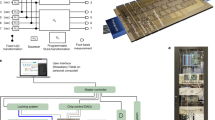Abstract
The field of computing known as quantum computing is devoted to creating computer technology that is based on the ideas of quantum theory (which makes sense of the way of behaving of energy and material on the nuclear and subatomic levels). These supercomputers are based on two aspects of quantum physical science: superposition and entanglement. As a result, quantum PCs can handle tasks at speeds that are significantly faster than those of traditional PCs and with a lot less energy consumption. On the other hand, Quantum logic gates are designed to empower this computing field. Programmable Logic Array is a type of PLDs (programmable logic devices) and is mainly used for designing combination logic mutually by sequential logic. It could be a general-purpose logic gadget that’s programmable and a client can configure the gadget as a simple logic gate operation to complex systems on a chip. In this work, a PLA is designed using Quantum-based gates. The features of Quantum-based computing help Quantum-based PLA to perform billions of activities simultaneously and can give immense memory in small space.
Access this chapter
Tax calculation will be finalised at checkout
Purchases are for personal use only
Similar content being viewed by others
References
Thapliyal, H., Ranganathan, N.: Design of reversible sequential circuits optimizing quantum cost, delay, and garbage outputs. ACM J. Emerg. Technol. Comput. Syst. (JETC) 6(4), 14–29 (2010)
Feynman, R.P.: Quantum mechanical computers. Found. Phys. 16(6), 507–531 (1986)
Barenco, A., et al.: Elementary gates for quantum computation. Phys. Rev. A 52(5), 3457 (1995)
Steane, A.: Quantum computing. Rep. Prog. Phys. 61(2), 117 (1998)
Hey, T.: Quantum computing: an introduction. Comput. Control Eng. J. 10(3), 105–112 (1999)
Aspuru-Guzik, A., Dutoi, A.D., Love, P.J., Head-Gordon, M.: Simulated quantum computation of molecular energies. Science 309(5741), 1704–1707 (2005)
Hempel, C., et al.: Quantum chemistry calculations on a trapped-ion quantum simulator. Phys. Rev. X 8(3), 031022 (2018)
Ors, R., Mugel, S., Lizaso, E.: Quantum computing for finance: overview and prospects. Rev. Phys. 4, 100028 (2019)
Ciliberto, C., et al.: Quantum machine learning: a classical perspective. Proc. R. Soc. A: Math. Phys. Eng. Sci. 474(2209), 20170551 (2018)
Dunjko, V., Briegel, H.J.: Machine learning & artificial intelligence in the quantum domain: a review of recent progress. Rep. Prog. Phys. 81(7), 074001 (2018)
Wiseman, H.M., Milburn, G.J.: Quantum theory of optical feedback via homodyne detection. Phys. Rev. Lett. 70, 548–551 (1993)
Wiseman, H.M., Milburn, G.J.: Quantum Measurement and Control. Cambridge University Press, Cambridge (2009)
Nurdin, H.I., James, M.R., Petersen, I.R.: Coherent quantum lqg control. Automatica 45(8), 1837–1846 (2009)
Dong, D., Petersen, I.R.: Quantum control theory and applications: a survey. IET Control Theory Appl. 4(12), 2651–2671 (2010)
Kaye, P., Laflamme, R., Mosca, M.: An Introduction to Quantum Computing. Oxford University Press, UK (January 2007). eBook-LinG, ISBN 0-19-857000-7
Mohammadi, M., Eshghi, M.: Behavioral description of quantum V and V+ gates to design quantum logic circuits. In: 2008 5th International Multi-Conference on Systems, Signals and Devices, pp. 1–5. IEEE (2008)
Knill, E.: Quantum computing with realistically noisy devices. Nature 434(7029), 39–44 (2005)
Ramezani, S.B., Sommers, A., Manchukonda, H.K., Rahimi, S., Amirlatifi, A.: Machine learning algorithms in quantum computing: a survey. In 2020 International Joint Conference on Neural Networks (IJCNN) (pp. 1–8). IEEE (July 2020)
DiVincenzo, D.P.: Quantum computation. Science 270(5234), 255–261 (1995)
Van Meter, R., Horsman, D.: A blueprint for building a quantum computer. Commun. ACM 56(10), 84–93 (2013)
National Academies of Sciences, Engineering, and Medicine. Quantum computing: progress and prospects. National Academies Press (2019)
Author information
Authors and Affiliations
Corresponding author
Editor information
Editors and Affiliations
Rights and permissions
Copyright information
© 2023 ICST Institute for Computer Sciences, Social Informatics and Telecommunications Engineering
About this paper
Cite this paper
Akter, F., Tabassum, T., Uddin, M.N. (2023). Programmable Logic Array in Quantum Computing. In: Satu, M.S., Moni, M.A., Kaiser, M.S., Arefin, M.S. (eds) Machine Intelligence and Emerging Technologies. MIET 2022. Lecture Notes of the Institute for Computer Sciences, Social Informatics and Telecommunications Engineering, vol 491. Springer, Cham. https://doi.org/10.1007/978-3-031-34622-4_35
Download citation
DOI: https://doi.org/10.1007/978-3-031-34622-4_35
Published:
Publisher Name: Springer, Cham
Print ISBN: 978-3-031-34621-7
Online ISBN: 978-3-031-34622-4
eBook Packages: Computer ScienceComputer Science (R0)




